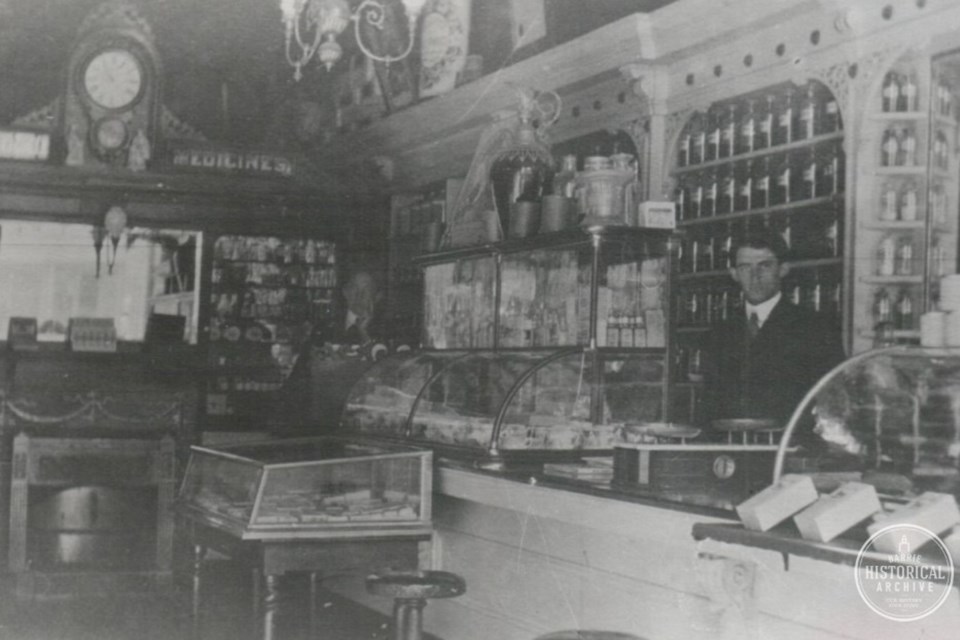Just prior to the First World War, a young couple arrived in town and brought with them dreams of happiness and success.
Fred Van Patter and his wife, Shirley, migrated from Owen Sound where Fred had spent two years working in sales at an automobile shop in that Georgian Bay town. With the knowledge he had acquired in this quickly exploding new industry, Fred decided to come to Barrie and seek his fortune here.
At first, Fred worked with George McLean at the corner of Mulcaster and Dunlop streets. McLean had brought the first Chevrolet car into Simcoe County.
By 1917, Fred Van Patter was the sole proprietor and was the local dealer for Overland cars. Not bad for a farm boy from Aylmer, Ont., south of London.
The success was short-lived. In 1919, the automakers of Overland vehicles were in trouble. A long strike had delayed production of a new car, which had been intended to rival Ford’s Model T, and the company was eventually absorbed by Chrysler.
In February 1920, Fred Van Patter sold his business to Buchanan & Son. The timing was right in more ways than one. Fred would need the money from the business sale to help his ailing wife, Shirley.
Mrs. Van Patter, the former Shirley Pineo, was also born on a farm in Malahide Township, near the community of Aylmer. Shirley and Fred married in 1905.
When Fred sold his dealership in Barrie, Shirley had been suffering from depression for a number of years. Of course, this golden age of the automobile was also a time of wondrous new advances in medications and Shirley Van Patter benefited from one of these.
Veronal was the answer. This was the brand name for Barbital, the first commercially sold barbiturate. From its 1903 invention, it was widely used for anxiety, depression and insomnia, and for years no prescription was required.
Eventually, Shirley Van Patter came to have a much bigger problem than that of her mental health condition.
Nobody has drug dependency on their list of future goals. Ordinary people, going about their daily lives, hit a bump in the road and come face to face with a drug, legal or otherwise, that quickly turns from friend to foe. This is what happened to Shirley Van Patter.
Shirley’s husband had the means to seek out some of the best care available at the time for her. The upscale Charles B. Towns Hospital on Central Park West in New York City was the place to go.
Charles Barnes Towns was a shady kind of character. He had worked on farms, and on the railroad, and then sold insurance. Towns had created an herbal cure for alcohol and drug dependency and saw a growing need and a chance to make a lot of money.
Theodore Roosevelt’s personal physician, Dr. Alexander Lambert, had been treating alcoholics at Bellevue Hospital for years and he saw potential in Towns’ elixir. The two partnered to open the Charles B. Towns Hospital in 1909.
The cure, a mix of belladonna, dried berries, tree bark and various hallucinogens, was given to wealthy patients recovering in sumptuous rooms overlooking Central Park. A five-day stay averaged about $300, which amounts to just under $5,000 today.
So, Fred Van Patter paid the fee and quietly delivered his wife into the care of the New York hospital which promised to remove all poisons from the patient’s body and to forever destroy any cravings for alcohol and drugs.
Likely, this would have remained a private affair, known to very few in Barrie, but the tragedy that followed was covered by the local newspapers.
Twelve days after her April 16 arrival, Shirley Van Patter was allowed to go outside for a walk on the streets of New York. Two hours later, her body was found next to an empty package of Veronal. She was 34 years old.
The bereaved husband sued the hospital for $50,000. In the end, he was awarded $8,000 in a New York courtroom.
Fred Van Patter went on to remarry and to open another garage on Dunlop Street West near Maple Avenue in 1923. When Fred died in 1934, his business neighbour, R.F. Garrett, owner of the Capitol Theatre, bought the lot and opened the Imperial Theatre.
The last of this block was torn down this past week to make room for condominiums.

